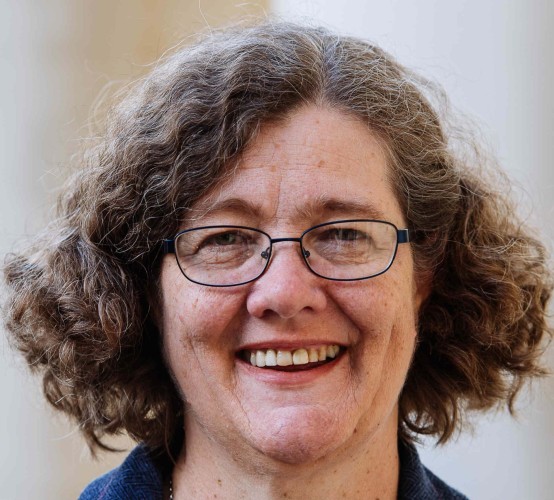We’re proud to be one of the RTGs funded by DFG that is able to invite Mercator fellows. The stay of guest researchers from abroad allow intense, long-term project-based collaboration between resident researchers of the RTG and from foreign universities. Although Mercator Fellows are on-site for only a fews month, the joint work continues after their stay.
Former Mercator Fellows

Professor Karen Renaud
Professor Karen Renaud is a Computing Scientist working on all aspects of Human-Centred Security and Privacy. She was educated at the Universities of Pretoria, South Africa and Glasgow.
She was particularly interested in deploying behavioural science techniques to improve security behaviours, and in encouraging end-user privacy-preserving behaviours.
In 2016/17 she was one of five UK Cyber Security Fulbright Awardees and spent 7 months working with Prof Merrill Warkentin at Mississippi State University in Starkville, Mississippi. She joined the Division of Cybersecurity at the University of Abertay in October 2017.
Prof. Renaud is known for her work on human-centered security and privacy. She did her studies at the Universities of Pretoria, South Africa and Glasgow. Prof. Renaud focusses her research in adding behavioral science techniques to the toolkit of security researchers to improve the security-related behaviors and to encourage end-user privacy-preserving behavior. In 2016/17 she was one of five UK Cyber Security Fulbright Awardees and spent 7 months working with Prof Merrill Warkentin at Mississippi State University in Starkville, Mississippi. She joined the Division of Cybersecurity at the University of Abertay in October 2017.
Prof. Renaud leads the division of cyber security at Albertay University in Scotland. She visited the RTG from May 7th to 31st, 2018 and is renowned for her work in the field of user “nudging” to improve the security-related behavior of online users; as such, the focus of her visit was research area A.
During her visit, Prof. Renaud was able to initiate close collaboration during and around the RTG seminar. For that, she gave a talk in the first seminar, learned about the PhD students' topics in the second seminar, and inspired a concluding discussion about the tension of user-privacy, user-security and the concept of “human failure” of the HCI-area.
With RTG PhD students, Prof. Renaud initiated six user studies:
* Experiment zur Verwendung ethischen Nudings im Kontext Cybersecurity (A.2, Verena Zimmermann)
* Erfassung des Meinungsbildes von Nicht-Experten zum Thema Cybersecurity (A.2, Verena Zimmermann)
* Kognitiv-affektive Reaktionen zu Begriffen aus Privacy und Security im Stroop-Test (A.2, Tim Schürmann)
* Endowment und Online-Privatsphäre (A.3, Nora Wessels)
* Kognitive Kosten starker Passwörter (A.2, Tim Schürmann)
* Maßnahmen zur 3D-Authentifizierung (D.1, Karola Marky)
More information about Professor Renaud can be found here.

Dr. Stephen Marsh
Dr. Marsh is a Trust Scientist and a thought leader in the phenomenon of trust for computational systems.
His PhD was a seminal work that introduced the first formalization of the phenomenon of trust (the concept of computational trust), and applied it to multi-agent systems. As a milestone in trust research, it brought together disparate disciplines and attempted to make sense of a vital phenomenon in human and artificial societies, and is still widely referenced today, being in the top tenth of one percent of Citeseerx's most cited articles in computer science. Dr. Marsh's current work builds extensively on this model, applying it to network security, critical infrastructure protection, and mobile-device security.
Dr. Marsh visited the RTG 2050 from Januar 27th until February 27th, 2018 for the second time after his short stay as guest in 2017. In several RTG seminars, he was able to introduce his research on trust and privacy, to develop the idea of an ambient privacy meter, and to provide in-depth feedback for many PhD students. Moreover, Dr. Marsh also acted as a Mentor and role model, he listened to personal and PhD-related problems of the PhD students. Even today, one year after his visit as Mercator Fellow, there is contact and vivid discussions between RTG PhD students and PostDocs and Dr. Marsh.
More information about Dr. Marsh can be found here.

Dr. Christy M.K. Cheung
Dr. Christy M.K. Cheung is Associate Professor at Hong Kong Baptist University. She received her Ph.D. from City University of Hong Kong.
Her research interests include virtual community, knowledge management, social computing technology, and IT adoption and usage. Her research articles have been published in MIS Quarterly, Decision Support Systems, Information & Management, Journal of the American Society for Information Science and Technology, and Information Systems Frontiers. Christy received the Best Paper Award at the 2003 International Conference on Information Systems and was the PhD fellow of 2004 ICIS Doctoral Consortium.
Dr. Christy M.K. Cheung is an Associate Professor of Information Systems and e-Business Management at Hong Kong Baptist University. She visited the RTG in September and October 2017 as a Mercator Fellow and gave invited talks at the RTG and the Chair of Software Business and Information Management.
Within her talk about “Societal Impacts of ICT Use: Understanding Bystanders’ Proactive Reporting Responses to Online Harassment” Dr. Cheung presented one of her current studies and gave interesting insights into her research leading to fruitful discussions with the auditorium.
More information about Dr. Cheung can be found here.

Professor Dr. Shizuo Fujiwara
Prof. Fujiwara at Chuo University in Tokyo and is a renowned expert for administrative and public law, particularly data protection law.
He visited the RTG in October 2018 to follow-up on work that has been initiated with Dr. Geminn and Anne Laubach at their research visits in Tokyo. During his stay, Prof. Fujiwara gave a talk on the (recent) development of the Japanese data protection law. This talk was not only part of the RTG’s seminar but also part the lecture series of the “Wissenschaftliches Zentrum für Informationstechnik-Gestaltung” ITeG. Additionally, Prof. Fujiwara also gave a talk on “Communication, Mobility and Data Protection” in the RTG seminar.
In the close collaboration, a couple of publications have been elaborated:
• Fujiwara,S./Geminn,C.: Reform des japanischen Datenschutzrechts im öffentlichen Bereich – Entwicklung des Rechts- und Gesetzessystems für den Datenschutz. Zeitschrift für Datenschutz
• Geminn,C./Fujiwara,S.: Das neue japanische Datenschutzrecht – Reform des Act on the Protection of Personal Information. Zeitschrift für Datenschutz 8/2016, S. 363-368.
• Geminn, C. / Laubach, A. / Fujiwara, S.: Schutz anonymisierter Daten im japanischen Datenschutzrecht – Kommentierung der neu eingeführten Kategorie der „Anonymously Processed Information. Zeitschrift für Datenschutz 9/2018, S. 413-420.
Moreover, his research visit inspired Prof. Fujiwara to develop a contribution to the book “Grundrechtsschutz im Smart Car” of the RTG’s PIs Roßnagel and Hornung.

Dr. Paul Gardner-Stephen
Dr. Paul Gardner-Stephen views himself as the digital version of a blacksmith, crafting creative and skilled solutions to a wide range of problems.
His research interests include, networking, scalable computing, mobile devices, mobile communication infrastructures, disaster and attack resilient technology, creating understandable computers and the application of all these to make the world a better place.
Dr. Paul Gardner-Stephen gave talk about Privacy and Trust of Mobile Users in Emergency Response Scenarios during his stay from October 2016 until January 2017.
Dr. Paul Gardner-Stephen (Senior Lecturer, Flinders University, Australia) has been selected as one of the Mercator fellows of the GRK 2050. His initial visit took place from 05.10.2016 to 21.01.2017. Prof. Hollick acted as the host of Dr. Gardner-Stephen. The fellowship is closely linked with Research Areas B (Privacy and Trust in Social Networks) and C (Privacy and Trust in Sensor-Augmented Environments) of the Doctoral College GRK PAT.
The general research subject of Dr. Gardner-Stephen was on Privacy and Trust of Mobile Users in Emergency Response Scenarios. In case of emergencies, individual users and the affected population in general can benefit if they utilize technical means to communicate and coordinate appropriate emergency response strategies. The use of mobile end systems can facilitate such means of communications and act as an enabler of mobile social networks among the affected population. It is vital for the protection of the vulnerable population that such solutions address information security and particularly trust and privacy aspects.
Aim of the collaboration with Dr. Gardner-Stephen as a Mercator fellow is to jointly work on creating privacy-preserving solutions for disaster relief communication systems. This involves to improve of the design of an existing emergency communication system to provide strong information security properties, can make effective use of existing social media platforms where appropriate, and can operate in a completely infrastructure-deprived and distributed manner, thus facilitating secure private and social communications in challenging environments. Joint work towards realizing this aim has been started during the first stay of Dr. Gardner-Stephen in Darmstadt.
The stay was very fruitful and yielded a number of excellent contribution such as publications as well as awards:
- Accepted article: M. Fomichev, F. Alvarez, D. Steinmetzer, P. Gardner-Stephen, M. Hollick. Survey and Systematization of Secure Device Pairing, IEEE Communications Surveys and Tutorials. Vol 99.
- Accepted conference paper: J. Lakeman, M. Lloyd, R. Challans, A. Wallace∗, M. Schmittner, M. Hollick, P. Gardner-Stephen. A Practical and Secure Social Media Facility for Internet-Deprived Populations. In proceedings of IEEE GHTC 2017 (accepted for publication, to appear).
- Accepted conference paper: P. Lieser, F. Alvarez, P. Gardner-Stephen, M. Hollick, D. Boehnstedt. Architecture for responsive emergency communications networks. In proceedings of IEEE GHTC 2017 (accepted for publication, to appear).
- Accepted conference paper: F. Alvarez, M. Hollick, P. Gardner-Stephen. Maintaining both availability and integrity of communications: Challenges and guidelines for data security and privacy during disasters and crises. In proceedings of IEEE GHTC 2016.
- Award winner at the Pacific Humanitarian Challenge (partner TU Darmstadt supported the application, Dr. Gardner-Stephen was the main applicant): http://pacifichumanitarianchallenge.org/winners/#InfraIndepMob
Additionally, an interdisciplinary cooperation between subareas C.1 (computer science), C.2 (law) and Prof. Gardner-Stephen resulted in a joint statement on a planned legislation on wireless devices in Germany that would have severely affected the work of area C.1. Further work on exploring and comparing the legal contexts in Germany and Australia/Pacific region is ongoing. It is focusing on analyzing the legal implications of distributed telecommunications networks and services consisting only of citizen’s devices, which lack centralized infrastructure.
During his stay, Dr. Gardner-Stephen interacted with PhD candidates. For instance he helped Mr. Max Maass to get started with his work in subarea C.1 on decentralized techniques for privacy-protection in human-centric sensor environments. This allowed a quicker familiarization with the state of the art in that area. Paul Gardner-Stephen also worked with the associated PhD from area C.1, which resulted in the aforementioned journal article.
More information about Dr. Gardner-Stephen can be found here.

Professor Vijay Varadharajan
Professor Vijay Varadharajan is the Global Innovation Chair Professor in Cyber Security at the University of Newcastle since 2017.
His research interests include Malware and Security Attacks and Trusted Computing as well as Security in Cloud Computing, in Internet of Things, in Big Data and Distributed Applications, in Software and in Internet.
Prof. Varadharajan visited the RTG 2050 from July 15th to 27th, 2016. His renowned expertise in the field of computational trust helped him to fructify the research of the RTG's research area D on “AlterEgo”. His time-limited visit was used beneficial for the RTG in different ways:
i) intensive discussions with the PhD students about their research ideas
ii) high-level exchange of visions with the PIs
iii) increased visibility of the RTG due to giving one of the Keynotes of the Security Week @ TU Darmstadt
In half-day workshops with focus on research projects D.1 and D.4, Prof. Varadharajan discussed the objective of the RTG by refining requirements and exemplary scenarios. Secondly, Prof. Varadharajan participated in in-depth discussions with PIs of the RTG as well as professors of neighboring fields (such as Prof. Sadeghi). Structurally, the visit of Prof. Varadharajan strengthened the collaboration of TU Darmstadt, Universität Kassel and the Macquerie University.
In 2018, an externally financed visit of Prof. Varadharajan helped to intensify the previously established collaboration, e.g., with (externally funded) RTG member Mikhail Fomichev. Moreover, research results from C.1, collected by PhD student Max Mass, created an international stir and was exchanged within this collaboration.
More information about Professor Varadharajan can be found here.


